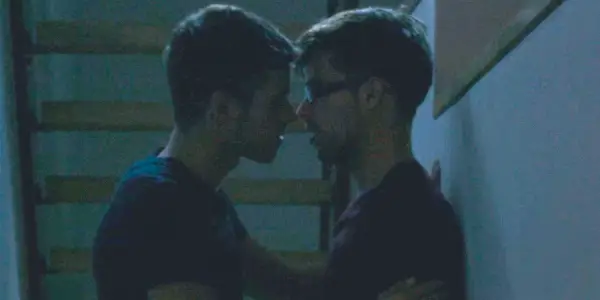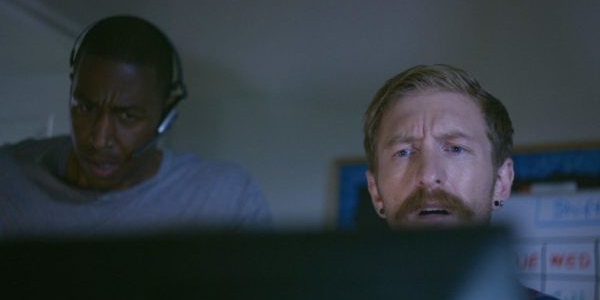Interview With LGBT Thriller CRISIS HOTLINE Director Mark Schwab

Andrew Stover is a film critic/writer from the Chicagoland. His…
In today’s world of cinema, there are more and more LGBT stories being told, but director Mark Schwab is determined to break the mold and tell an LGBT story that rightfully belongs in the thriller category. Upsetting in its own palpable depiction of betrayal, Schwab achieves an LGBT thriller that restricts the details, propels the viewers to pay attention, and ends up being a digital nightmare that’s very much grounded in reality.
A couple of months ago, I had the chance to see and review Mark Schwab‘s LGBT thriller Crisis Hotline. The thriller follows Simon, a cynical and discontented LGBT crisis hotline employee, as he tries to deal with a phone call from Danny, who says he plans on killing three people. Danny begins telling his story and his truth, prompting Simon to probe Danny’s motives and hopefully obviate the worst possible scenario.
I had the chance to ask director Mark Schwab a couple of questions about his LGBT thriller Crisis Hotline and his experiences/motivations behind the piece. I also ask about his artistic drive and what/who inspires him.
Knowing society’s reliance on technology and the usage of dating apps, did you have any previous knowledge or experience with such apps before you thought up this concept?
Mark Schwab: Like most gay men, I had some experience with dating apps. Nothing really negative fortunately but I had heard some stories from friends about some strange meetups. It did get me to think that if someone was ruthless enough or determined to abuse dating apps for their own gain, it wouldn’t be too difficult to pull off in today’s culture.

Crisis Hotline outlines a timid and lonely protagonist named Danny, who is actually phoning an LGBT crisis hotline, and narrating his story to an employee named Simon. This narrative structure is built on perspective, and it’s unclear throughout if Danny’s truth is the actual truth. But that’s where I believe you capture a certain reality to crisis hotlines in general. There’s no way to know if the person who’s calling is speaking the full truth. And that’s always a scary feeling, not knowing if the person is an actual threat to themselves or others, and if police officers need to be on the scene. Was that intentional? Were you trying to prompt viewers to question Danny’s story and how it was unfolding?
Mark Schwab: Great question and observation! Yes, I certainly was trying to play with the audience’s expectations of who is telling the truth and what is “really” happening. Over the years, it has become very clear to me that memory/recall of certain situations can be a very unreliable indicator of reality. Our memory of events are put through our own individual filters and some of the “truth” gets lost.
Sometimes I’ll watch a movie that I haven’t seen in many years that I’m sure I remember clearly and find out scenes play much differently. In Crisis Hotline, there is a lot going on behind the scenes designed to make the audience think one thing then I kind of pull the rug out from under their feet at the end. It’s supposed to make you look back at the movie in a different way and people tell me all the time that Crisis Hotline gets better with repeated viewings.
How much knowledge did you have of crisis hotline centers when creating the movie? Simon, in particular, is an employee at the crisis hotline center in the movie, and he’s growing weary of phone calls from LGBT folk who complain about discrimination in their everyday lives, but they’re clearly not a danger to themselves or others. Did you purposefully sketch Simon this way to vividly unveil the faults, or at the very least, pet peeves of those who work at crisis hotline centers?
Mark Schwab: I did another film back in 2001 about a suicide situation and did some research with an actual phone counselor to get things right. When I started writing Crisis Hotline, I did more current research and was shocked at how much had changed in 16 years. Mainly the fact that so few calls that come in to suicide hotlines are genuine crisis calls. So, yes, Simon does say things in the beginning of the movie that current phone counselors have said in interviews.
Right from the start, the relationship between Danny and Kyle appears ethereal, alluding to some kind of darkness. Would you say the entire movie is meant to paint a sordid image of dating apps? Or was telling a horror story in the digital realm something you knew would resonate with today’s society?
Mark Schwab: It was never intended to demonize dating apps. Personally, I do think dating apps have a lot of shortcomings but they aren’t inherently “bad” or “wrong”. I mainly used them as a topical plot device to create a horrifying, but still possible, story.

Crisis Hotline has a crafty last scene, envisaging a moment of sheer betrayal without showing the incident in its full entirety. What kind of techniques (technical or narratively) did you find yourself employing to magnify your vision of betrayal and self-condemnation?
Mark Schwab: I keep the viewer purposefully in the dark about specific details because I do believe in the adage that what we can imagine in our worst nightmares is scarier than what I can directly put on the screen. Our amazing DP Dante Yore did a phenomenal job of using shadows to reflect the darker aspects of the characters’ intentions. Mystery in general – the conscious decision to withhold key information – is scary to me. It’s why I love David Lynch’s films because the answers are technically there but it takes work to figure it all out.
Was it difficult to sell the concept of the movie to investors and distributors?
Mark Schwab: The “investors” were a very easy sell since it was our own production company that put up the money to make it – no outside investors. We got a good distributor (High Octane Pictures) pretty early on based on our trailer so that went smoothly. The hard sell was film festivals! We entered Crisis Hotline in about a dozen film festivals and got rejected by all of them – even the LGBT film festivals. Everyone was shocked by that.
Do you think horror comes easier when dealing with modern technology and, in this instance, dating apps? Do you believe it’s more terrifying when horror tries to somehow relate to reality?
Mark Schwab: I don’t think it’s easier. No feature film is easy. As for relating to reality…maybe so but I refer back to David Lynch; I find his films terrifying even though they lean on the supernatural.

Was it difficult to acquire actors who could fulfill your vision?
Mark Schwab: Every actor on Crisis Hotline was absolutely great. They worked so hard under very trying conditions and they never complained once. Looking back now, I’m so impressed they pulled off those performances with so few takes and a crazy tight shooting schedule.
The fashion in which you incorporated the LGBT angle is far more novel than how another filmmaker may utilize the LGBT perspective. How did an LGBT thriller come to mind?
Mark Schwab: Thank you for saying that. I chose an LGBT thriller mainly because so few of them get made and I wanted to create an absorbing noir-type thriller on a subject and in a style that I hadn’t seen in a movie yet.
What’s the biggest thing you want viewers to take away from Crisis Hotline?
Mark Schwab: I want them to mainly get caught up in the story and characters. To be intent on finishing the film because they are so curious as to how it will all pan out. I never meant Crisis Hotline to be a “message movie” per se. But if a viewer wants to see a message there, they are free to find one. I won’t mind.
For your next movie (and all of your future projects), do you plan on coasting through various genres? You spoke about a sci-fi thriller you want to get financed, what keeps you inspired and dedicated as a filmmaker? Despite the taxing struggle, what’s the most valuable thing you get out of it?
Mark Schwab: I would love to work in every genre. My favorite director is Sidney Lumet for a number of reasons; he also worked in every genre and he never made a movie with a Sidney Lumet “style” – the story and characters always came first and he left a great legacy of memorable films. I would love to have a career like Sidney Lumet.
The main thing about moviemaking that inspires me is the incredible challenge of just pulling it off. With so many moving parts and fighting the physical, mental and emotional elements every single day, it really is a miracle if a feature gets finished let alone actually distributed. But all of that truly invigorates me. And I do mean ALL of it – I love every step of the process from blank page to scouting locations to crunching budget numbers. I think that’s essential if you are going to get anywhere as a filmmaker – you need to love it all.
Film Inquiry thanks Mark Schwab for taking the time to talk with us.
Watch Crisis Hotline
Does content like this matter to you?
Become a Member and support film journalism. Unlock access to all of Film Inquiry`s great articles. Join a community of like-minded readers who are passionate about cinema - get access to our private members Network, give back to independent filmmakers, and more.
Andrew Stover is a film critic/writer from the Chicagoland. His film & TV reviews can be found on Film Inquiry & Film Threat.













